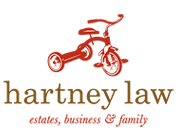From the “crappy estate planning advice professionals give their customers” file:
I’ve heard a TON of terrible advice that comes from financial professionals about estate planning–but this is probably the most common and the most damaging. And it usually comes from banks and bankers:
“You should put one of your kids on your account so they can pay your bills for you if something happens to you.”

I’ve heard it from tellers, branch managers, but I’ve even heard this from some financial advisors and brokerage reps who simply don’t know better. The reason some professionals give this advice is they’ve seen what happens when elders experience disability, and the pandemonium that ensues when family has no authority to access accounts, pay bills, or otherwise care for the financial well being of their elders in an emergency. So in all fairness, the folks who give this advice are trying to offer some solution to a much larger problem than they’re equipped to handle.
Why putting kids on your accounts is such a terrible idea
First, putting a kid on your account is a gift of one-half the value of that account. Your child now OWNS half that account. That’s not the same thing as giving a child power to use that account for your benefit. It means that you’ve just given half your money to your child.
Second, that gift might need to be reported to the IRS if the value of the gift is over $14,000. There are a great many of these gifts out there in the world that have never been reported. If a gift of an account is significant, the IRS may find out about it and make you get compliant with reporting the gift (or gifts as often the case is). Usually, there won’t be any gift tax due unless the gift is enormous, but if it’s over that $14,000 limit, it still has to be reported.
Third, if you have more than one child, you’ve just cut your other children out of their potential inheritance. A bank account owned by you and one of your children is a joint tenancy with right of survivorship–meaning that your child as the other owner will simply receive that account after you die. There is no probate over that joint tenancy asset and no requirement that your child share with their siblings. In fact, there are significant barriers to that child sharing that asset with their siblings after you die.
Fourth, if the child with whom you’ve shared your account is sued or has a judgment or lien against them, your bank account could be lost to that creditor. By making a gift of that asset, you subjected your savings to someone else’s liabilities. There is a legal argument that you didn’t intend for that to happen and a defense that your asset shouldn’t be subject to their liability–but you’ll have to lawyer up to defend against a co-owner’s creditor. Why would you do that to yourself?
Fifth, you’ve just opened that account up to temptation. Sometimes, even when we think we’ve done a great parenting job, our kids can simply go sideways. Even good people can find themselves in the middle of the “fraud triangle” and make a bad decision. The fraud triangle is the set of conditions always present when fraud is committed.
When kids commit fraud
Kids commit fraud when we set them up for it. The three conditions required for all fraud to happen are:
- Opportunity: when you added your kid to your account you gave them the first condition that must be present–the opportunity to commit fraud.
- Rationalization: the result of complex mental gymnastics that people can end up in when they think of the reasons why their actions are justifiable. It’s usually something like, “Well, I need it more than they do and they can spare it,” or “They owe me anyway so I’ll just take what they owe me,” or “They’ll never know it’s gone and I’ll replace it before they notice.” See how easy that is to rationalize?
- An Unspeakable Need: This is the most dangerous element of all. It’s the shame one feels around money that cannot be spoken out loud. This is what drives fraud–the inability to tell someone when they’re hurting financially, have made choices that haven’t worked out, or simply failed at financing their lives. The Unspeakable Need is the piece you will never know about in advance, that when combined with the opportunity you hand your child when you put them on your account can end up with your child stealing from you.
So for everyone’s sake, do not put your children in this position. Ever. There is a better way.
What’s the better way?
For many people, the better way it to get a full estate plan in place that empowers your trusted advisors to help you with your financial life if you’re disabled and when you die. Often this means creating a “revocable living trust” in which to place your assets so that your successor can take control without taking direct ownership of your finances.
A revocable living trust is the Swiss Army Knife of estate planning–it helps solve many issues around disability and death in a way that other planning devices simply cannot.
A revocable living trust can:
- Empower your kids to cooperate in your physical and financial care
- Protect your assets from your children’s creditors
- Avoid making inadvertent gifts
- Help you not set your children up for failure or fraud
- Ensure the equitable and fair distribution of your remaining assets to all your children when you die
- Avoid costly court proceedings over you if you become disabled
- Indicate to your children your expectation of how they should behave if you’re disabled and when you die
- Keep courts out of your family governance by making sure you set up excellent financial and healthcare management tools in advance of an emergency
Estate planning done right is not cheap. It shouldn’t be. You want a professional who knows what they’re doing to give you good advice–not the well-meaning but woefully inadequate advice your banker might have for you. In an effort to save some money, many families have ended up spending a great deal more time in lawyer fees and court costs down the road–not to mention heartache!
Don’t let that happen to you. Spend some money and do it right. Find an attorney you can work with and get your estate planning done–the sooner the better. If you want our support in getting a plan in place, please feel free to contact our office to schedule your Discovery Meeting today.

 A later-in-life attorney, Martha Hartney opened the practice in 2010 to serve the people she loves because she is committed to helping moms and dads bring their greatest gifts into parenting fearlessly and with joy and making sure children are completely cared for if something happens to their parents.
A later-in-life attorney, Martha Hartney opened the practice in 2010 to serve the people she loves because she is committed to helping moms and dads bring their greatest gifts into parenting fearlessly and with joy and making sure children are completely cared for if something happens to their parents.
